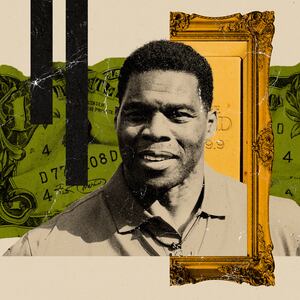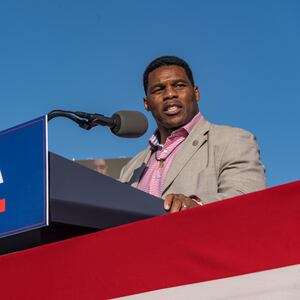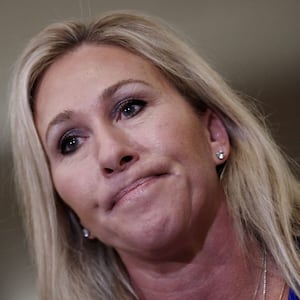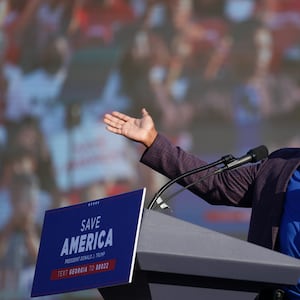STATESBORO, Georgia—When Georgia Senate candidate Gary Black stopped for an event at the Bulloch County GOP office on Wednesday, he convinced 100 percent of the voters there to drop their support for Herschel Walker and back him instead.
Unfortunately for Black, 100 percent of the voters there on this weekday afternoon amounted to Chuck Chatraw, a retiree wearing a “Let’s Go Brandon” T-shirt.
Chatraw showed up at the party office to hear from Black, but had been anticipating that he would cast a ballot in the May 24 primary for Walker, the Georgia football legend turned Georgia Senate candidate with Donald Trump’s enthusiastic support.
Black’s pitch changed his mind, however. He delivered a clinical case against Walker, shredding him for everything from his recent move to Georgia from Texas, to his absence from the campaign trail, to describing in graphic detail the serious allegations of violence and abuse that several women have lodged against him, recorded in legal documents.
Black closed with a stark warning: If Republicans give Walker a pass on that record, Democrats won’t—and the incumbent on the ballot, Sen. Raphael Warnock (D-GA), could very well “march right straight back to Washington for six more years.”
When Black left, Chatraw was sold.
“I wish people knew what his background is,” he said of Walker. He noted, too, that many of his friends still support Walker—and how he’s worried they will find out about his record “too late.”
The scene that unfolded here, weeks from the primary, was a distillation of the broader problem facing the entire field of GOP candidates aiming to stop Walker from doing what every poll shows him doing: Running away with the party’s nomination.
Walker’s GOP rivals are betting that voters won’t really like Herschel Walker all that much once they actually get to know him—past the version they saw in the early 1980s leading the University of Georgia’s backfield. And they’re sounding the alarm now, before Democrats pour tens of millions of dollars into attacks that just one GOP candidate is making now.
If they can just reach enough Republican voters, these candidates are confident they can convince them that Walker is an unqualified candidate, coasting on his heroic reputation in the state, who will lose a general election matchup with Warnock.
The problem for them is actually reaching enough primary voters to cut through the advantages of Walker’s near-universal name recognition, decades of worship as a football hero, his close association with Trump, and his massive campaign war chest.
If it sounds like a tall task, it is.
Walker’s challengers don’t need to overtake him. They just have to get him below 50 percent of the vote share in May’s election to force a runoff with the second-place finisher in June.
But no public poll has shown Walker dropping below that threshold. While his numbers have declined, he is still in a strong position. There are not many Georgia Republican insiders who are convinced Walker will get dragged anywhere near 50 percent—even as more questionable aspects of his record continue to come out, such as his dishonesty over his business record.
“You can’t underestimate the extent to which most Georgians view Herschel somewhere between a beloved family member and a saint,” said one Georgia Republican operative. “Those attacks just don’t land on Herschel like they do on a typical politician because we feel like we know him and he’s one of us.”
The question of how to stop Walker—and if that means trying to get primary voters to care about his past—is a contentious one among his GOP rivals. And how they handle it may reverberate well past the primary.
Warnock, fresh off his 2020 win, is raising historic sums of money and is already using it to bolster his brand by bankrolling TV ads across the state. But facing a brutal 2022 midterm environment nationally, Democrats need any break they can get in Georgia, a sharply divided state that has hosted some of the country’s most intense campaigns in recent years.
One of the Democrats’ few bright spots has been GOP infighting—and some Republicans’ willingness to shout Walker’s most explosive weaknesses from the rooftops.
Black, a seasoned Republican politician serving as state Agriculture Commissioner, is frank in his belief that the only way to defeat Walker—and, in his view, preserve the GOP’s chances in November—is to go nuclear on him.
His campaign has set up a website—called the “Real Herschel”—which amounts to the entire kitchen sink of opposition research on Walker. He has already cut an ad, which he says has elicited audible gasps from people who’ve seen it, hitting Walker mercilessly over his domestic violence allegations. With few changes, Democrats could run the spot in the general election.
Black said he is a “big fan” of Walker from his University of Georgia days. “But this is not a game,” Black said in an interview. “The future of the country, conservative control of the U.S. Senate, is not a joke. But they're treating it as a joke.”
The other candidates in the primary have been happy to let Black play hitman, focusing their pitches on less controversial turf.
Latham Saddler, a former Trump administration official and Navy SEAL, said he decided from day one not to attack Walker over his personal conduct.
Instead, Saddler plans to spend his money—he raised nearly $4 million last year—on TV ads introducing himself and going after Walker’s absence from the campaign trail, which he called the “Biden basement strategy.”
“I'm not focusing on his past,” Saddler said of Walker. “I'm focusing on what he's doing and not doing now.”
Kelvin King, a businessman and Air Force veteran in the race, sounded a nearly identical note.
“I'm not focused so much on Mr. Walker's past, but I am focused on his present and the future of Georgia,” he said in an interview after a campaign forum in Statesboro on Wednesday night. (He and Black were the only candidates present.)
Walker’s camp, meanwhile, dismissed their rivals’ strategies as desperation ploys from candidates with no shot at victory.
Mallory Blount, Walker’s spokesperson, said Black’s “campaign is completely lifeless which is why he has no choice but to obsessively focus on Herschel.”
“Herschel Walker is the only candidate who can unite the party and defeat Raphael Warnock in November,” said Blount. “Herschel is dominating the Republican primary in both fundraising and polling. He will be Georgia’s next U.S. Senator.”
Walker, who has long been close to the Trump family, entered the Senate race in August after much public cajoling from the former president. He instantly became a frontrunner and fundraising powerhouse, netting $5.4 million in the last three months of 2021 alone.
While his rivals have criss-crossed the state doing events—King says he has done 300—Walker has been a scarce presence on the campaign trail, preferring Fox News hits over interviews with local press and private events over public ones.
Still, most public polls of the primary have shown Walker with commanding advantages over his rivals, even if his share of support has slipped from the sky-high margins he enjoyed near the beginning of the race.
An April survey from Emerson College found Walker leading the field by a huge margin. But at 57 percent support, he was just outside the poll’s margin of error from the all-important 50 percent threshold to avoid a runoff. Black was in a distant second place, with 13 percent.
Among grassroots Republicans, fondness for Walker is high—and not only because he is perhaps the most sainted figure in the state’s unofficial religion of college football.
Brant Kennedy, a minister, had stopped in the small eastern Georgia town of Sandersville to see Gov. Brian Kemp—one of Trump’s top public enemies—at a campaign stop on Thursday. He said he was supporting Walker “100 percent” and believes he is the only candidate who can beat Warnock.
“Gary Black is a good guy,” Kennedy said, “but he can’t win.”
There is no small amount of disbelief in the rest of the GOP primary field that Walker is considered the candidate that can win, not just by rank-and-file voters, but figures like Senate Minority Leader Mitch McConnell (R-KY), who has blessed his campaign.
In an interview during his stop in Statesboro, Black ticked through the top Washington Republicans who have enthusiastically backed Walker, despite his baggage.
“You'd think they did the homework first,” Black said. “I’d love for them to be working on solving the border crisis and inflation and get their nose out of Georgia politics. I know how to win a race here.”
Saddler, who notes he is a Georgia Bulldog “through and through,” said Walker’s standing is a reflection of celebrity and little else.
“These are incredibly serious times for the country, and celebrities are not going to bail us out of this mess,” Saddler said. “We've got to do the work ourselves, and it's going to require serious leaders to do it.”
Each candidate gives a version of that pitch, and they insist that when they give it to voters who weren’t tuned into the race—or were Walker supporters—they become enthusiastic converts who take yard signs with them.
In a way, Walker’s rivals are putting their faith in a GOP electorate that may no longer exist. Everyone acknowledges the powerful role of celebrity in making him the primary’s frontrunner, but his detractors treat celebrity as if it were a liability in the party that twice made Donald Trump its nominee.
“To move back from Texas and expect to be handed a United States Senate seat because you're a celebrity—when I shine a spotlight on that, voters beg to differ,” Saddler said.
In a prior version of the GOP, Saddler (a national security expert) and Black (a statewide officeholder who can talk on the spot about the intricacies of the pecan trade) would perhaps be the top-tier recruits to represent this state.
In this election, however, their best case scenario is a runoff election with a Trump-backed football star who had not voted in an election, or lived in Georgia, before 2020. It’s easy to see how that state of affairs might frustrate the high-achievers who are finding themselves as also-rans compared to a candidate that is, effectively, a roll of the dice for the GOP.
It may. But they have no choice but to grin and bear it.
“It never frustrates me to talk to the people, to spread my message and to share my results,” said King, who, like Walker, has his own inspirational tale of finding success as a Black man in America.
“So,” King said, “in our formula, it’s a win.”











